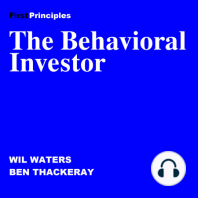75 min listen

S3E2 ✔️ Merle van den Akker: Compounding Investments, Alone, Won’t Fix Poverty.
S3E2 ✔️ Merle van den Akker: Compounding Investments, Alone, Won’t Fix Poverty.
ratings:
Length:
61 minutes
Released:
Jun 15, 2021
Format:
Podcast episode
Description
Merle van den Akker is a behavioral science PhD candidate at Warwick Business School. She runs the Money on the Mind (http://www.moneyonthemind.org/) blog and co-hosts the Questioning Behavior (https://youtube.com/channel/UCcz8ms4jDnmqcRlOR5RQSIg) podcast. She can also be found on Twitter (http://www.twitter.com/moneymindmerle).
In this interview we discussed her research on contactless payments and other technology-based means of removing friction and a sense of loss from the paying process. This is a fundamental issue for those practicing personal financial self care, who wish to maximize the proportion of their income that is invested rather than lost during unnoticeable spending events.
The interview also covered research on poverty and the feeing of time as someone struggling to survive. We discovered that hyperbolic discounting rates modulate depending on one’s level of financial distress. A key study she cited is On the Psychology of Poverty (https://science.sciencemag.org/content/344/6186/862). This lead us to a discussion of structures in society that stop people lifting themselves out of poverty, a key challenge to our assumption that the compounding sheet discussed throughout this series shall be sufficient to take care of people’s financial prosperity.
Similar to our S1E9 interview with Leigh Caldwell, she pointed out that business ventures are a major differentiating factor in finding financial success. It appears then that not only good financial compounding behavior but also starting a business shall need to be a focus of this podcast going forward, to answer the question why almost no one is seriously on a path to accumulating a billion dollars within 3 generations.
Finally, as a PhD candidate, Merle was an excellent source of information on conferences:
https://eshop.qmul.ac.uk/conferences-and-events/conferences-events/conferences-events/behavioural-finance-working-group-2021
http://www.rbfc.eu/
https://waset.org/behavioral-finance-and-markets-conference-in-october-2021-in-paris
https://conferenceindex.org/conferences/behavioral-economics
https://www.aobf.org/
https://www.behavioraleconomics.com/event/boulder-summer-conference-on-consumer-financial-decision-making/
https://www.consumerfinance.gov/data-research/cfpb-research-conference/2021-cfpb-research-conference/
https://warwick.ac.uk/fac/soc/wbs/subjects/bsci/events/spudm_2021/
https://www.ukfinance.org.uk/events
https://cepr.org/content/cepr-network-household-finance
---
Send in a voice message: https://anchor.fm/the-behavioral-investor/message
In this interview we discussed her research on contactless payments and other technology-based means of removing friction and a sense of loss from the paying process. This is a fundamental issue for those practicing personal financial self care, who wish to maximize the proportion of their income that is invested rather than lost during unnoticeable spending events.
The interview also covered research on poverty and the feeing of time as someone struggling to survive. We discovered that hyperbolic discounting rates modulate depending on one’s level of financial distress. A key study she cited is On the Psychology of Poverty (https://science.sciencemag.org/content/344/6186/862). This lead us to a discussion of structures in society that stop people lifting themselves out of poverty, a key challenge to our assumption that the compounding sheet discussed throughout this series shall be sufficient to take care of people’s financial prosperity.
Similar to our S1E9 interview with Leigh Caldwell, she pointed out that business ventures are a major differentiating factor in finding financial success. It appears then that not only good financial compounding behavior but also starting a business shall need to be a focus of this podcast going forward, to answer the question why almost no one is seriously on a path to accumulating a billion dollars within 3 generations.
Finally, as a PhD candidate, Merle was an excellent source of information on conferences:
https://eshop.qmul.ac.uk/conferences-and-events/conferences-events/conferences-events/behavioural-finance-working-group-2021
http://www.rbfc.eu/
https://waset.org/behavioral-finance-and-markets-conference-in-october-2021-in-paris
https://conferenceindex.org/conferences/behavioral-economics
https://www.aobf.org/
https://www.behavioraleconomics.com/event/boulder-summer-conference-on-consumer-financial-decision-making/
https://www.consumerfinance.gov/data-research/cfpb-research-conference/2021-cfpb-research-conference/
https://warwick.ac.uk/fac/soc/wbs/subjects/bsci/events/spudm_2021/
https://www.ukfinance.org.uk/events
https://cepr.org/content/cepr-network-household-finance
---
Send in a voice message: https://anchor.fm/the-behavioral-investor/message
Released:
Jun 15, 2021
Format:
Podcast episode
Titles in the series (27)
S1E7 How T.E.P. Investments Arbitrages Small Cap Investor Behavior by The Behavioral Investor